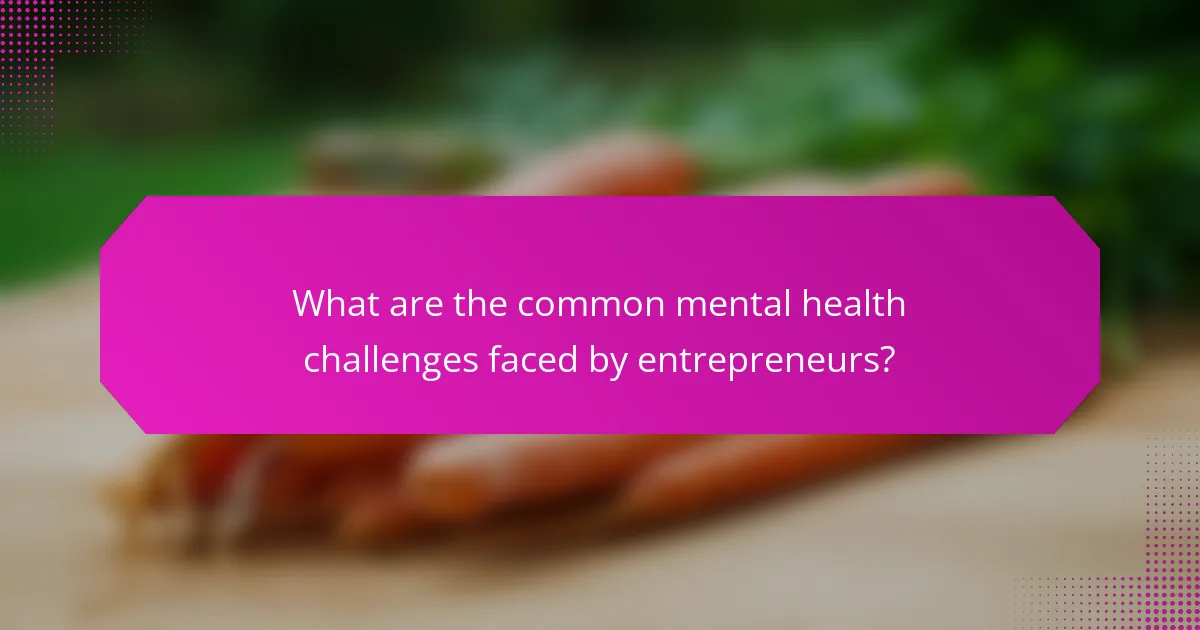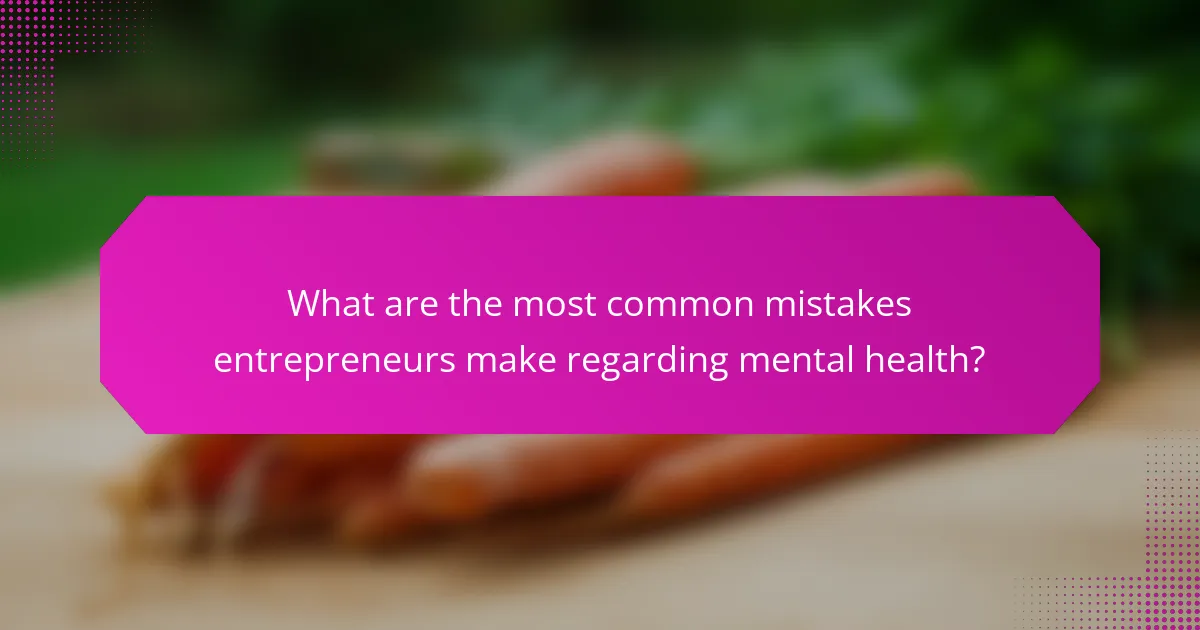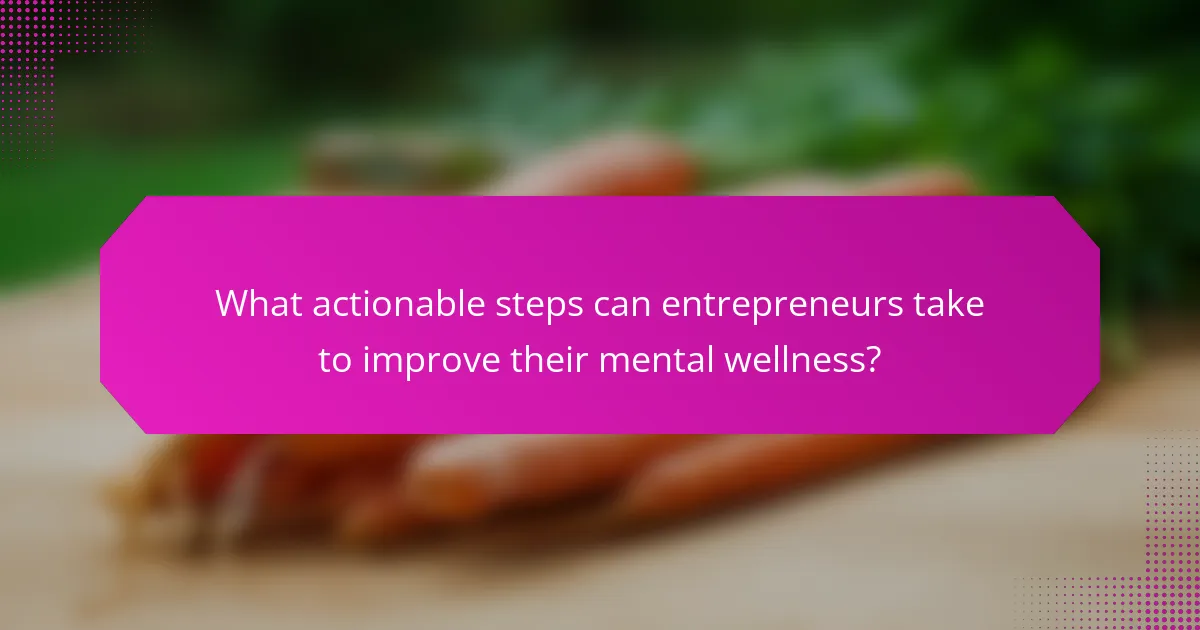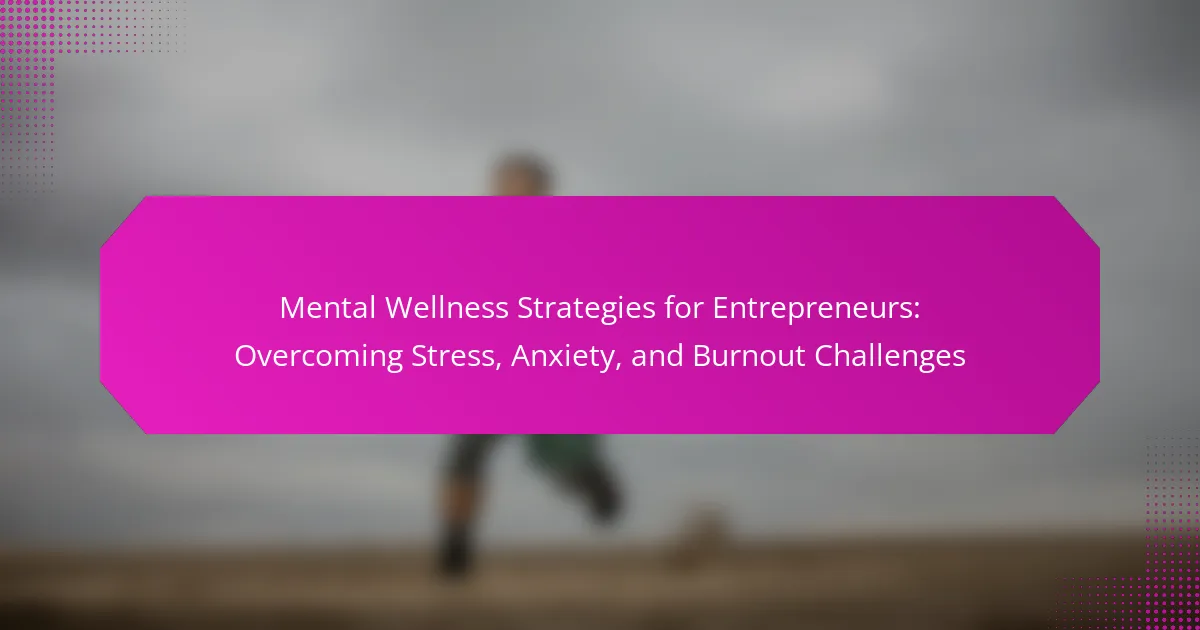Entrepreneurs often struggle with stress, anxiety, and burnout, which can impair their performance and decision-making. This article explores effective mental wellness strategies, including mindfulness practices, structured time management, and the establishment of support networks. Additionally, it highlights the importance of physical activity and nutrition, while also addressing common mistakes that hinder mental health. By prioritising these approaches, entrepreneurs can enhance their well-being and achieve greater success.

What are the common mental health challenges faced by entrepreneurs?
Entrepreneurs commonly face stress, anxiety, and burnout due to high demands and uncertainty. These mental health challenges can hinder performance and decision-making.
Stress often arises from juggling multiple responsibilities and financial pressures. Anxiety may develop from fear of failure or market fluctuations. Burnout, characterised by emotional exhaustion, results from prolonged stress without adequate recovery.
Implementing mental wellness strategies, such as mindfulness practices and time management techniques, can mitigate these challenges. Seeking support from peers or professionals also plays a crucial role in maintaining mental health.
How does stress manifest in entrepreneurial settings?
Stress in entrepreneurial settings often manifests through anxiety, burnout, and decreased productivity. Entrepreneurs face unique pressures, including financial uncertainty and long working hours, which can exacerbate stress levels. As a result, many experience physical symptoms like fatigue, insomnia, and headaches. Implementing mental wellness strategies, such as mindfulness practices and time management techniques, can help mitigate these stressors. Recognising stress early allows entrepreneurs to adopt effective coping mechanisms, ultimately fostering a healthier work environment.
What role does anxiety play in business ownership?
Anxiety significantly impacts business ownership by affecting decision-making and overall productivity. Entrepreneurs often face heightened stress, leading to decreased focus and increased risk aversion. This can result in missed opportunities and hindered growth.
Managing anxiety through mental wellness strategies is essential for success. Techniques such as mindfulness, exercise, and time management can enhance resilience. Implementing these strategies fosters a healthier work environment, ultimately benefiting both the entrepreneur and the business.
Research indicates that over 70% of entrepreneurs experience anxiety at some point, highlighting the need for effective coping mechanisms. Addressing mental wellness not only improves personal well-being but also enhances business performance.
In conclusion, recognising the role of anxiety in business ownership is crucial. By adopting proactive mental wellness strategies, entrepreneurs can navigate challenges, reduce stress, and achieve sustainable success.
How can burnout affect business performance?
Burnout significantly hinders business performance by reducing productivity and increasing absenteeism. It leads to poor decision-making and decreased creativity, ultimately affecting team morale. According to a Gallup study, employees experiencing burnout are 63% more likely to take a sick day. Furthermore, burnout can result in higher turnover rates, costing businesses an average of 1.5 to 2 times an employee’s salary to replace them. Addressing burnout through mental wellness strategies can improve overall business outcomes.

What are effective universal mental wellness strategies for entrepreneurs?
Effective universal mental wellness strategies for entrepreneurs include mindfulness practices, regular physical activity, and establishing strong support networks. These approaches help combat stress, anxiety, and burnout. Mindfulness techniques, such as meditation, enhance focus and emotional regulation. Engaging in physical exercise releases endorphins, improving mood and reducing tension. Building a support network fosters connection, providing emotional resilience and practical advice. Prioritising these strategies can lead to sustainable mental wellness, ultimately enhancing entrepreneurial success.
How can time management improve mental health?
Effective time management significantly enhances mental health by reducing stress and preventing burnout. By prioritising tasks and setting realistic goals, entrepreneurs can create a balanced workload. This balance fosters a sense of control, leading to lower anxiety levels. Additionally, structured time management encourages breaks, which are essential for mental rejuvenation. As a result, improved focus and productivity emerge, contributing to overall mental wellness.
What are the benefits of establishing a work-life balance?
Establishing a work-life balance enhances mental wellness by reducing stress and preventing burnout. It fosters productivity, improves focus, and promotes overall well-being. Studies indicate that balanced individuals experience lower anxiety levels and better job satisfaction. This balance encourages healthier lifestyle choices, leading to improved physical health. Additionally, it nurtures personal relationships, which are crucial for emotional support. Prioritising work-life balance is essential for entrepreneurs facing high stress.
How does physical health impact mental wellness?
Physical health significantly influences mental wellness by reducing stress and enhancing cognitive function. Regular exercise, proper nutrition, and adequate sleep contribute to lower anxiety levels and improved mood. Studies show that physical activity releases endorphins, which are natural mood lifters. Additionally, maintaining a healthy lifestyle helps entrepreneurs manage burnout effectively, allowing for better focus and productivity. Prioritising physical health creates a strong foundation for mental resilience in the entrepreneurial journey.

What unique mental wellness strategies can differentiate successful entrepreneurs?
Successful entrepreneurs often employ unique mental wellness strategies to combat stress, anxiety, and burnout. These strategies include mindfulness practices, structured time management, and the establishment of support networks.
Mindfulness practices, such as meditation and deep-breathing exercises, enhance focus and emotional resilience. Structured time management techniques, like the Pomodoro Technique, promote productivity while preventing overwhelm. Establishing support networks, including mentors and peer groups, provides emotional backing and shared experiences.
Additionally, regular physical activity and proper nutrition are crucial. Research indicates that exercise releases endorphins, improving mood and reducing stress levels. Entrepreneurs who prioritise these wellness strategies often report higher levels of satisfaction and productivity.
How can networking support mental health?
Networking can significantly enhance mental health by providing emotional support and reducing feelings of isolation. Engaging with peers fosters a sense of community, which can alleviate stress and anxiety. Research indicates that social connections can improve overall well-being and resilience against burnout. Additionally, sharing experiences with others can offer new perspectives and coping strategies, further supporting mental wellness.
What is the significance of mentorship in managing stress?
Mentorship significantly alleviates stress for entrepreneurs by providing guidance, emotional support, and accountability. Effective mentors share experiences and strategies, helping mentees navigate challenges. This relationship fosters resilience, enhancing mental wellness and reducing anxiety. Research indicates that entrepreneurs with mentors report lower stress levels and higher satisfaction. Mentorship not only offers practical advice but also creates a supportive network, vital for overcoming burnout.
How can creativity enhance mental resilience?
Creativity enhances mental resilience by fostering adaptability and problem-solving skills. Engaging in creative activities reduces stress and boosts mood, which is crucial for entrepreneurs facing challenges. Studies show that creative expression can lead to a 30% increase in emotional well-being. This unique attribute highlights creativity’s role in building a robust mental framework. As a result, entrepreneurs can better navigate stress, anxiety, and burnout.

What rare mental health strategies should entrepreneurs consider?
Entrepreneurs should consider rare mental health strategies like nature immersion, expressive writing, and mindfulness retreats. These approaches foster resilience against stress and burnout. Nature immersion connects individuals to natural environments, enhancing mood and reducing anxiety. Expressive writing allows entrepreneurs to process emotions, leading to improved mental clarity. Mindfulness retreats offer deep relaxation and self-reflection, promoting overall well-being.
How can mindfulness practices be tailored for business owners?
Mindfulness practices can be tailored for business owners by integrating short, focused sessions throughout the day. Techniques such as mindful breathing, body scans, and brief meditation can reduce stress and enhance focus. Incorporating these practices into daily routines fosters resilience against anxiety and burnout. For example, setting aside five minutes for deep breathing before meetings can improve clarity and decision-making. Regularly scheduled mindfulness breaks can also enhance overall mental wellness, allowing entrepreneurs to manage challenges more effectively.
What unconventional therapies have shown promise for entrepreneurs?
Unconventional therapies like art therapy, forest bathing, and breathwork have shown promise for entrepreneurs. These approaches can enhance mental wellness by reducing stress, anxiety, and burnout.
Art therapy allows entrepreneurs to express emotions creatively, fostering relaxation and self-discovery. Forest bathing, or immersing oneself in nature, has been linked to improved mood and cognitive function. Breathwork techniques promote mindfulness and emotional regulation, helping to manage overwhelming feelings.
Incorporating these therapies can lead to unique benefits, such as increased creativity and resilience, essential for entrepreneurial success.

What are the most common mistakes entrepreneurs make regarding mental health?
Entrepreneurs often neglect their mental health, leading to stress, anxiety, and burnout. Common mistakes include prioritising work over self-care, failing to set boundaries, and ignoring signs of mental distress. Many entrepreneurs believe they must be constantly productive, which can exacerbate feelings of overwhelm. Additionally, a lack of support systems and resources can hinder their ability to manage mental wellness effectively. Recognising these pitfalls is crucial for fostering resilience and maintaining a healthy work-life balance.
How can neglecting mental health impact business sustainability?
Neglecting mental health can severely impact business sustainability by leading to decreased productivity and higher turnover rates. Entrepreneurs experiencing stress, anxiety, and burnout may struggle to make sound decisions, harming overall organisational performance. Research shows that companies with strong mental wellness strategies report 30% higher productivity. Moreover, addressing mental health fosters employee engagement, which is critical for long-term success. Prioritising mental wellness not only supports individuals but also enhances business resilience.
What are the consequences of isolation on mental wellbeing?
Isolation negatively impacts mental wellbeing by increasing stress, anxiety, and the risk of burnout. Entrepreneurs may experience heightened feelings of loneliness, decreased motivation, and difficulty in maintaining work-life balance. Research indicates that social connections are crucial for emotional support and resilience. Regular interaction with peers can mitigate these effects, promoting mental wellness and productivity.

What actionable steps can entrepreneurs take to improve their mental wellness?
Entrepreneurs can enhance their mental wellness by incorporating structured routines, mindfulness practices, and regular physical activity. Prioritising self-care, setting boundaries, and seeking support from peers or professionals also play crucial roles in managing stress and preventing burnout.
1. Establish a daily routine to create stability.
2. Practice mindfulness techniques such as meditation or deep breathing.
3. Engage in regular physical exercise to boost mood and energy.
4. Set clear work-life boundaries to prevent overcommitment.
5. Seek social support from mentors or peer groups.
6. Consider professional counselling for tailored strategies.
What daily practices can help reduce stress and anxiety?
Daily practices that can help reduce stress and anxiety include mindfulness meditation, regular physical exercise, and establishing a structured routine. Mindfulness meditation improves focus and emotional regulation, while exercise releases endorphins, enhancing mood. A structured routine fosters a sense of control and predictability, reducing feelings of overwhelm. Incorporating these strategies can lead to significant improvements in mental wellness for entrepreneurs facing stress and anxiety challenges.
How can entrepreneurs create a supportive work environment?
Entrepreneurs can create a supportive work environment by prioritising mental wellness strategies. Implementing flexible work schedules, promoting open communication, and providing access to mental health resources can significantly reduce stress and anxiety. Regular team-building activities foster camaraderie and resilience, while mindfulness practices enhance focus and well-being. Additionally, recognising and addressing burnout through workload management is essential for sustaining productivity and morale.
What expert insights can guide entrepreneurs towards better mental health?
Entrepreneurs can enhance their mental health by implementing effective wellness strategies. Prioritising self-care, establishing boundaries, and seeking support are essential.
Regular exercise reduces stress and boosts mood, while mindfulness practices improve focus and resilience. Time management techniques help prevent overwhelm, allowing for a balanced work-life dynamic.
Networking with fellow entrepreneurs can provide valuable insights and emotional support. Engaging in professional counselling or coaching offers tailored strategies for managing anxiety and burnout effectively.
Incorporating these practices fosters a healthier mindset, ultimately leading to increased productivity and fulfilment in entrepreneurial endeavours.


